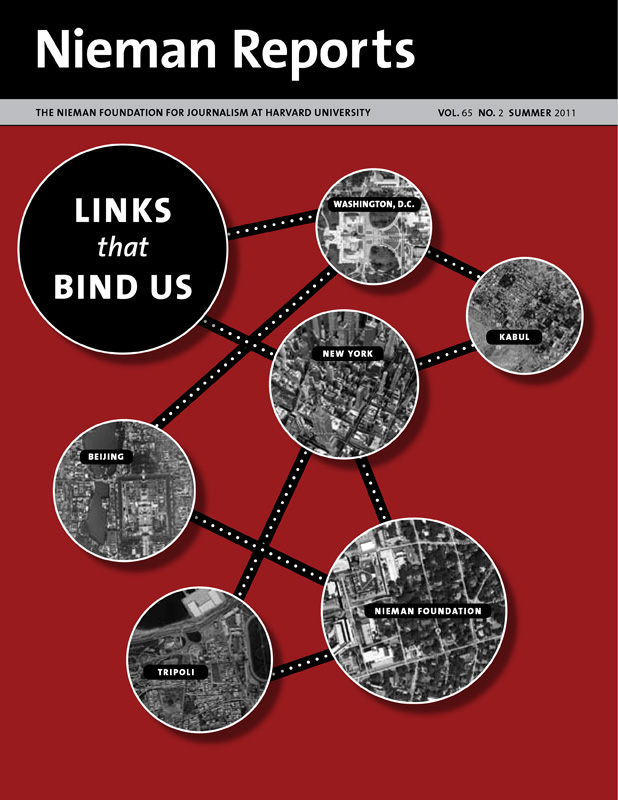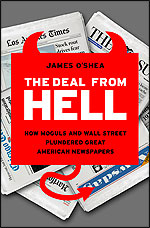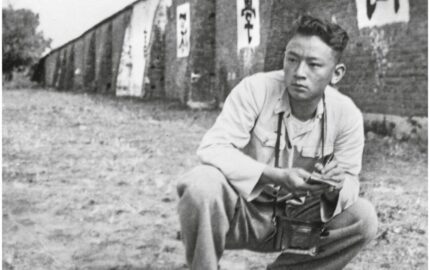The plot of James O'Shea's book reads like a fast-paced novel: greedy owners, corporate intrigue, a boorish manager, and a staff revolt. Yet it's a true story.
In "The Deal From Hell: How Moguls and Wall Street Plundered Great American Newspapers," published in June by PublicAffairs, O'Shea, a former top editor at the Chicago Tribune and the Los Angeles Times, chronicles the business deals and internal warfare that threatened the two papers where he spent most of his career. He worked at the Chicago Tribune for 27 years, including five as managing editor; in Los Angeles, his job as the paper's editor was short-lived during turbulent times.
The troubles started when the Chicago Tribune's owner, the Tribune Company, bought the Times Mirror Company, owner of the Los Angeles Times. It was the biggest merger in the history of American journalism, one that went terribly wrong and got worse several years later when real estate billionaire Samuel Zell acquired the Tribune Company in what he came to call a "deal from hell."
RELATED ARTICLE
“Journalism of Value = Context for Communities”
- James O'SheaThat was bad enough but there was more bad news. As O'Shea points out, even before the ascendancy of the Internet, the media landscape was undergoing seismic shifts. Newspapers missed, ignored or underestimated the rise of cable television, which coincided with the beginning of a big-time decline in their circulation. "It's hard to believe," he writes, "that these momentous changes failed to generate panic in newspaper publishing circles."
In 2006, as Times staff members revolted against the newsroom directives coming out of the corporate headquarters in Chicago, O'Shea was assigned to take over the editorship of the Times and quell the dissent. The next year O'Shea left the paper rather than make more staff cuts.
RELATED LINK
“Ugly Details in Selling Newspapers”
- New York Times review by David CarrHarvard's Joan Shorenstein Center on the Press, Politics and Public Policy offered him a fellowship, giving him time, he hoped, to think about the future of newspapers. Back in Chicago before heading to Cambridge, his old paper landed on the doorstep, promoting a search for the city's best cheeseburger. He was certain that this was the right time to cancel his subscription and move on.
In "The Deal From Hell: How Moguls and Wall Street Plundered Great American Newspapers," published in June by PublicAffairs, O'Shea, a former top editor at the Chicago Tribune and the Los Angeles Times, chronicles the business deals and internal warfare that threatened the two papers where he spent most of his career. He worked at the Chicago Tribune for 27 years, including five as managing editor; in Los Angeles, his job as the paper's editor was short-lived during turbulent times.
The troubles started when the Chicago Tribune's owner, the Tribune Company, bought the Times Mirror Company, owner of the Los Angeles Times. It was the biggest merger in the history of American journalism, one that went terribly wrong and got worse several years later when real estate billionaire Samuel Zell acquired the Tribune Company in what he came to call a "deal from hell."
RELATED ARTICLE
“Journalism of Value = Context for Communities”
- James O'SheaThat was bad enough but there was more bad news. As O'Shea points out, even before the ascendancy of the Internet, the media landscape was undergoing seismic shifts. Newspapers missed, ignored or underestimated the rise of cable television, which coincided with the beginning of a big-time decline in their circulation. "It's hard to believe," he writes, "that these momentous changes failed to generate panic in newspaper publishing circles."
In 2006, as Times staff members revolted against the newsroom directives coming out of the corporate headquarters in Chicago, O'Shea was assigned to take over the editorship of the Times and quell the dissent. The next year O'Shea left the paper rather than make more staff cuts.
RELATED LINK
“Ugly Details in Selling Newspapers”
- New York Times review by David CarrHarvard's Joan Shorenstein Center on the Press, Politics and Public Policy offered him a fellowship, giving him time, he hoped, to think about the future of newspapers. Back in Chicago before heading to Cambridge, his old paper landed on the doorstep, promoting a search for the city's best cheeseburger. He was certain that this was the right time to cancel his subscription and move on.




